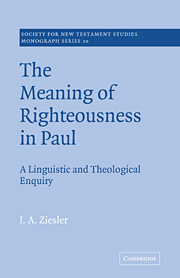Book contents
- Frontmatter
- Contents
- Preface
- Abbreviations
- Introduction
- 1 The Old Testament
- 2 Greek Usage of δíκαιος and cognates
- 3 Later Judaism I: the Septuagint
- 4 Later Judaism II: Intertestamental writings
- 5 Later Judaism III: Philo and Josephus
- 6 Later Judaism IV: The Rabbinic writings
- 7 The New Testament apart from the Pauline corpus
- 8 Paul: Philippians, Colossians, Thessalonians, Ephesians, the Pastorals, and Corinthians
- 9 Righteousness in Christ
- 10 Galatians
- 11 Romans
- Conclusion
- Appendix I Antonyms
- Appendix II The Apostolic Fathers
- Bibliography
- Index of passages cited
- Index of authors
5 - Later Judaism III: Philo and Josephus
Published online by Cambridge University Press: 04 August 2010
- Frontmatter
- Contents
- Preface
- Abbreviations
- Introduction
- 1 The Old Testament
- 2 Greek Usage of δíκαιος and cognates
- 3 Later Judaism I: the Septuagint
- 4 Later Judaism II: Intertestamental writings
- 5 Later Judaism III: Philo and Josephus
- 6 Later Judaism IV: The Rabbinic writings
- 7 The New Testament apart from the Pauline corpus
- 8 Paul: Philippians, Colossians, Thessalonians, Ephesians, the Pastorals, and Corinthians
- 9 Righteousness in Christ
- 10 Galatians
- 11 Romans
- Conclusion
- Appendix I Antonyms
- Appendix II The Apostolic Fathers
- Bibliography
- Index of passages cited
- Index of authors
Summary
PHILO
About 114 instances of the noun, and 245 of the adjective and adverb, have been examined. The results are such that it would be wearisome and space-consuming to list and classify them all. In the Greek tradition, the noun is either generic virtue, or one of the cardinal virtues, or sometimes, the queen of those virtues. As a virtue, it is concerned with the relations between men, and societies, and with the quality of soul out of which proper relations spring. Much the same is true of the adjective, except that it, and even more the adverb, may be used in a rather neutral manner akin to the English ‘he rightly decided to go…’, where to speak of a virtue is somewhat stretching the point.
One interesting fact is that the words are rarely used of God, the noun only 3 times out of 114, and the adjective only 7 times out of 245 (adjective and adverb together).
There is a striking absence of forensic cases, the nearest being Flacc. 50 where the adjective means ‘deserving’. Otherwise the emphasis is heavily ethical, though often abstract. Between onefourth and one-third of the cases of man's righteousness carry an explicit reference to God, but these figures are of small value, because in the kind of extended treatment which one finds in Philo, such a reference may very well be implicit at least as often as it is explicit. In this, Philo shows himself more Hebrew than Greek.
- Type
- Chapter
- Information
- The Meaning of Righteousness in PaulA Linguistic and Theological Enquiry, pp. 105 - 111Publisher: Cambridge University PressPrint publication year: 1972



